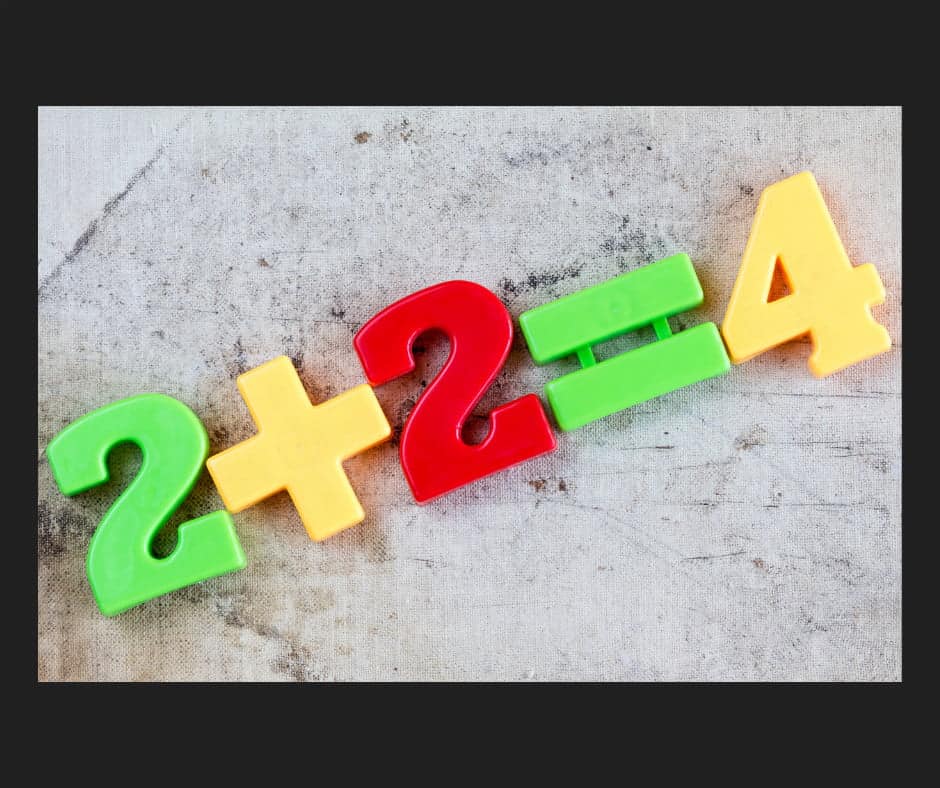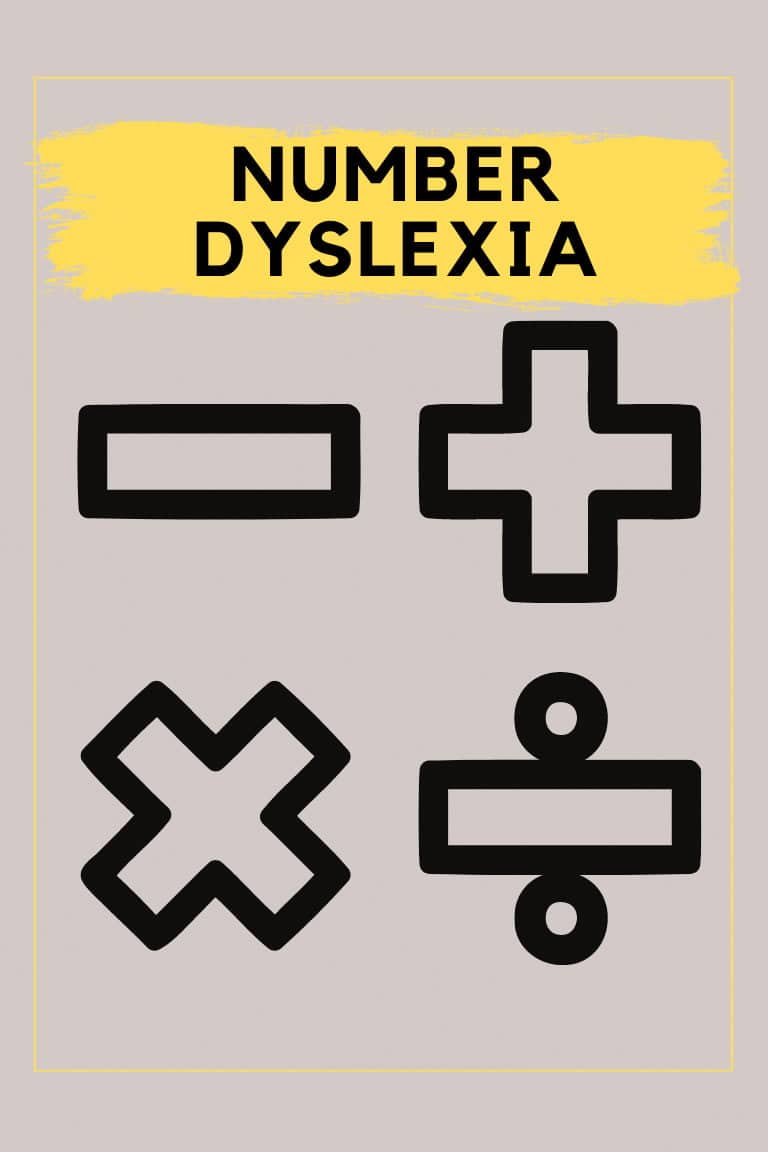So, Is Number Dyslexia A Thing?
To get straight to the point, the answer is no. There is no such thing as number dyslexia. But we can’t stop there.
Using the term “number dyslexia” causes too much confusion for a specific learning disability that we already know little about.
I am not sure exactly where the phrase originated, but let’s work together to educate ourselves so that we can stop the spread of this confusing term.
What is number dyslexia called?
When people use the term number dyslexia, they generally are talking about a learning disability called dyscalculia.
Chances are you’ve never heard of it and you don’t know how to pronounce it. Give it a try- duhs · kal · kyoo · lee · uh. You can also listen to the pronunciation here.
At the end of this article, we will examine some commonly phrased questions using the term number dyslexia. But for now, let’s compare and contrast dyscalculia and dyslexia.
Both dyscalculia and dyslexia are specific learning disabilities. There are many different types of specific learning disabilities.
Feel free to watch this video, which gives a good visual of the relationship between dyscalculia and dyslexia.
Dyslexia is a term used to refer to difficult reading, more specifically decoding words. Sometimes it is used as a generic term, wrongly, for math. Hence, this may be where the confusion comes in.
A person who is dyslexic can certainly have problems in math. However, those problems would stem from being able to read math problems or reading the names of numbers.
It is also true that a person can have both dyslexia and dyscalculia at the same time. But please understand they are two different learning disabilities.
Dyscalculia is a specific learning disability that impacts an individual’s ability to do basic math. People with this math disorder have poor number sense.
What does number dyscalculia look like?
You may be tempted to ask, “What does number dyscalculia look like?” Resist the urge. To get a more clear understanding of What dyscalculia looks like, check out this video.
Let’s Not Use Number Dyslexia Anymore
Now that you know better, your next obvious question may be, “What are the best dyscalculia interventions to help number dyslexia in adults? Got ya!
We are no longer using that term. Right, I just wanted to see if you were truly following. But to answer the question, the truth is there are no quick fixes. There is no magic pill.
People are often impacted throughout their life. Unlike Dyslexia, Dyscalculia is less talked about, less studied, and less diagnosed by name.
But there is hope!
I will share one of my favorite dyscalculia intervention strategies, however, I wrote a very informative article called 5 Best Intervention Strategies For Dyscalculia.
I highly recommend you check this article out. It has some of the best dyscalculia treatment techniques to date.

Treatment For Dyscalculia: Multisensory Instruction
One of the best ways to instruct those with any learning disability, including Dyscalculia, is through multisensory instruction.
Using images/animations is a game changer. Why? Those with dyscalculia are often brilliant at decoding images.
Multisensory instruction is a way of teaching that engages multiple senses simultaneously.
One of the best, most innovative programs that I’ve come across to help students with basic multiplication facts is Times Tales.
It’s a story-based program that helps children memorize the times’ tables.
It’s visual and it’s auditory! The students simply watch the stories and they eventually start to memorize the tables. It’s almost effortless!
In an independent study of Times Tales, “All the students with learning disabilities noted an average increase in score of at least 70%.”
Florida National University conducted this study and independently published its result.
What makes Times Tales even better is that it’s cost-effective. As an adult, I really enjoyed watching the stories with my daughter and inadvertently brushed up on my facts too.
That is a win/win.
I actually reviewed Times Tales. Take a look below. It is so out of the box.
So there is hope and this and the other strategies for dyscalculia mentioned in the aforementioned article are a great place to start.
Common Question Asked About “Number Dyslexia”
Q. What Is Number Dyslexia Called?
- Nothing, because there is no such thing. However, you are probably referring to dyscalculia. (See pronunciation above.)
Q. Do I Have Number Dyslexia?
- No, you do not have number dyslexia. However, you may have dyscalculia. However, to determine that officially you will need to take a dyscalculia test.
Q. Can You Have Number Dyslexia?
- No, you can’t have number dyslexia, but you can have dyscalculia.
Q. What is the number version of dyslexia?
- There is no number version of dyslexia, but the specific name for the learning disability that impacts math is dyscalculia.
I think you have a great understanding now of why you should not use the phrase number dyslexia.
It simply doesn’t make any sense. It causes too much confusion.
In fact, run the other way any time you come across information that embraces this phrase.
If they are not using the term dyscalculia, then they are not very well-versed in understanding what a math disorder is.
Other Questions You May Have About Dyscalculia
Q. What Causes Dyscalculia?
- Dyscalculia like its dyslexia counterpart is most likely the result of genes and heredity. It often runs in families. Studies have also found that genetics may play a part. Brain images show that there is a difference in the brain images of those with dyscalculia and those without dyscalculia.
Q. Is Dyscalculia A Disability?
- Certainly, it is. It is recognized as a specific learning disability covered by IDEA. However, the wording doesn’t include dyscalculia by name.
Q. How To Help A Child With Dyscalculia?
- This is a loaded question. Know that they can be helped. For some of the best dyscalculia strategies read the article I wrote: 5 Best Intervention Strategies For Dyscalculia.
Q. Can dyscalculia be cured?
- No, never! You can learn to overcome some of the challenges it causes, but it can’t be cured. It’s not something that one can outgrow.
Q. Is Dyscalculia Common?
- Dyscalculia is very common, it is more common than we think. It most likely occurs just as often as dyslexia. We just don’t know as much about it. Dyslexia has been researched a lot more than dyscalculia.
Disclosure: Please note that some of the links above are affiliate links and at no additional cost to you, I’ll earn a commission. Know that I only recommend products and services I’ve personally used and stand behind. When you use one of my affiliate links, the company compensates me, which helps me run this blog and keep all of my in-depth content free of charge for readers (like you).

Thanks for addressing dyscalculia. I actually never heard of this until now. I love how you shared causes and strategies for intervention. Another great read!